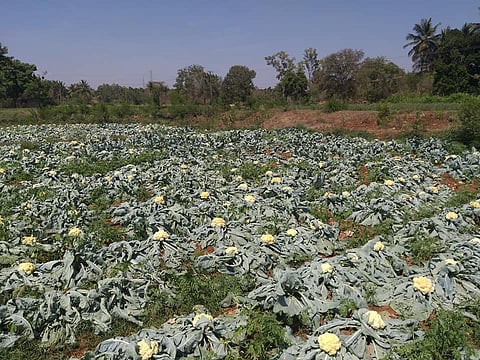

The 21-day national lockdown to contain the spread of coronavirus (COVID-19) has created significant additional stress on farmers across Karnataka, who have been suffering from successive years of drought and floods.
Even though the lockdown included exceptions on all forms of agricultural and allied activities, police action and stringent imposition of the lockdown by district authorities have curtailed the farmers’ ability to arrange transport to ferry their produce. And even if they managed to get their produce to the markets, the lockdown has deeply cut down the number of wholesale buyers.
Experts and farmers who spoke to TNM believe that the impact of the lockdown will not be temporary and will have a lasting impact on the crop being harvested for the next season as well.
Speaking to TNM, Kodihalli Chandrashekhar, president of the Karnataka Rajya Raitha Sangha, a major farmers’ collective and political outfit, said, “Agricultural markets are closing abruptly and farmers are unable to sell their produce. Turmeric, grapes and pineapple are the major crops being harvested now in Karnataka. This is also the time that ginger is harvested and transported to north India.”
He added, “Bananas need to be harvested by now and it is already two weeks late. They are rotting in the plantations. In the Tungabhadra belt, the rice harvest usually begins this week but for this, we need people to do it and even if it is harvested somehow, we need it to be sold in the market. Cotton needs to be extracted from the plants in northern Karnataka districts of Koppal, Ballari, Yadgir, Raichur, Belagavi. We need labourers to do this. How will this be done? What will be the condition of farmers who are facing losses due to this? Do the decision makers know the costs of cultivating these crops?”
The lockdown has not only led to loss of income for farmers but also significant food wastage. With much of the produce unable to reach its destination due to major supply chain issues, vegetables, milk and the like have either been dumped into cattle feed or discarded. This kind of waste is occurring even as those who are economically disadvantaged, especially migrant workers, have been left to manage without two square meals a day in the state.
In a viral video, a milk producer is seen pouring a huge quantity of milk into a canal in Chikkodi taluk of Belagavi district.
Mahesh Bhat, a photojournalist and documentary filmmaker closely following the agri sector in Karnataka, said the entire supply chain has been broken. He said, “I am in touch with many of the farmers directly and they have said produce worth lakhs of rupees are left on the farms. They are unable to do anything with it. There is no supply chain, and there is no way to send products to the market as not all district administrations have allowed movement of these vehicles. Many of the mandis are even closed or partially open. The truth is there is a lot of food that is stuck in the supply chain and this really needs to restart.”
Reports said that the producer threw away around 1,500 litres of milk as he could not get any buyers. Usually, milk which is sold for Rs 30 per litre was being bargained for Rs 10, The Hindu reported. The Karnataka Milk Federation has also stopped taking milk from local producers in many places.
The Deccan Herald reported that Rs 600 crore worth of grapes, grown less than 100 km away from Bengaluru in rural Bengauru, Chikkaballapura and Kolar districts, also are at the risk of being discarded.
A video from Mysuru of tomatoes left by a farmer for cows to feast on as he failed to get enough buyers in the wholesale market has also been shared widely.
(With inputs from Prajwal Bhat)